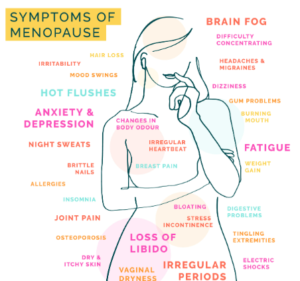Weight Gain & Menopause
Weight gain during menopause is a common complaint. Research shows that over 43% of menopausal women are obese and that women typically gain about 1.5 pounds per year during their 50s and 60s. This weight tends to accumulate in the abdominal region.
It is unclear how much of this weight gain is due to the hormonal changes of menopause or other aging-related factors.
However, what is clear is that menopausal weight gain in women does not have to be inevitable. Here’s what you need to know about the causes of weight gain, associated risks, and how to manage your body weight.
Menopause can indeed impact weight loss, and it’s a common concern for many women. Let’s explore why:
Remember, it’s not just about the numbers on the scale—prioritize overall health and well-being during this phase of life!
What Causes Weight Gain During Menopause? Gaining weight quickly during menopause? Several factors can contribute to weight gain, including:
Aging
As people get older, they tend to gain weight because they naturally lose lean muscle mass, a condition known as sarcopenia. When muscle mass decreases, our metabolism slows down because it takes more energy to maintain muscle than fat, even when we’re at rest. This results in burning fewer calories, leading to weight gain. Research shows that people typically lose 3% to 8% of their muscle mass every decade after the age of 30, with muscle loss speeding up after the age of 60.
Hormones
Weight gain in women as they age is influenced by hormonal changes, especially decreasing levels of estrogen, regardless of menopausal status. Research confirms that estrogen plays a crucial role in suppressing hunger signals, leading to reduced food consumption. Additionally, weight gain tends to result in fat accumulation around the midsection.
For example, a compelling study tracked average-weight premenopausal women for five years. By the third year, those who had entered menopause or were transitioning into it (perimenopause) exhibited a significant increase in total fat mass, abdominal fat, and visceral fat compared to the study’s outset.
Hormone Fluctuations: During menopause, both elevated and very low levels of estrogen can lead to increased fat storage. This hormonal shift can make losing weight more challenging.
Lifestyle
Regular physical activity is crucial for preventing weight gain at every stage of life. Despite the challenges, it’s important to emphasize the significance of exercise, especially for older adults. A
study comparing different age groups found that 60% of older adults had no intention of engaging in regular physical activity in the next six months, compared to just 25% in the young adult group. It’s clear that there is a need for strategies to motivate and support older adults in maintaining an active lifestyle.
Loss of Muscle Mass: As we age, hormonal changes and decreased physical activity contribute to muscle loss. Less muscle mass means a slower metabolism, making weight management more challenging.
Sleep Problems
Menopausal individuals may experience hot flashes, night sweats, and increased anxiety at night. Research shows that insufficient sleep can lead to weight gain, possibly because poor sleep can lead to low energy levels and decreased physical activity, as well as affect how our bodies process fat while we sleep.
Inadequate Sleep: Many women experience sleep disturbances during menopause, which is linked to weight gain.
What Are the Risks of Menopause Weight Gain?
After menopause, there is a higher likelihood for individuals to experience obesity or develop metabolic syndrome compared to before menopause. Metabolic syndrome is characterized by high blood pressure, high blood sugar, abnormal cholesterol and lipid levels, and excess abdominal fat. In the United States, 65% of women aged 40 to 65 are obese, and this figure rises to 74% for women over the age of 65. It’s important to note that addressing excess weight is key in reducing the risk of health conditions such as diabetes, heart disease, and high blood pressure.
Diabetes
After menopause, women are three times more likely to be obese or have metabolic syndrome compared to before menopause. Metabolic syndrome is characterized by high blood pressure, high blood sugar, abnormal cholesterol and lipid levels, and excess abdominal fat. In the United States, 65% of women aged 40 to 65 are obese, and the number rises to 74% for women over the age of 65. Excess weight is associated with health risks such as diabetes, heart disease, and high blood pressure.
Increased Insulin Resistance: Aging often leads to insulin resistance, making weight loss more difficult.
Heart Disease
Cardiovascular disease is the top cause of death among women. The risk of heart disease rises in women after menopause due to the decrease in estrogen, which has protective effects on the heart. When coupled with obesity or being overweight—another risk factor for heart disease—menopausal weight gain can pose a significant threat to women’s heart health.
High Blood Pressure
During menopause, women may face an increased risk of high blood pressure due to the absence of the protective effects of estrogen. This can lead to the narrowing of blood vessels, which makes it harder for blood to flow freely. Additionally, menopausal weight gain often results in the accumulation of belly fat, and a larger waist circumference is associated with a greater risk of high blood pressure.
What Is a Healthy Weight?
Although body mass index (BMI) has limitations, it is a valuable predictor of health risks. As people age, health risks increase with underweight or obesity. The following are weight guidelines.
Abdominal Fat Accumulation: Fat storage shifts from hips and thighs to the abdomen during menopause, increasing the risk of metabolic syndrome, type 2 diabetes, and heart disease.
How Long Does Menopause Weight Gain Last?
Although the average weight gain varies widely, with 20% of women gaining 10 pounds or more during the menopausal period, the weight eventually stabilizes after menopause if healthy eating and regular exercise are maintained.
How to Prevent Weight Gain During Menopause
While menopause weight gain is typical, it doesn’t have to be a given. Here’s what you can do to prevent it:
Nutrition: Following the Slim180 Nutritional guidance program, learn how to keep weight stable and achieve your weight loss goals, then stabilize your loss and learn to maintain!
Strategies to reduce daily calorie intake might include:
Limit or avoid alcohol: There is no nutritional value in alcoholic beverages, and the calories add up quickly.
Steer clear of sweet drinks: Beverages like sodas, juice, and coffee drinks are high in sugar and, like alcohol, are high in calories and low in nutrition.
Limit processed foods: Highly processed foods are low in fiber and often high in salt, sugar, and/or fat. One study found that people who ate processed foods ate more calories and gained more weight than when they consumed a diet of whole, unprocessed foods.
Consider following Slim180 Nutritional Guidance Program: Many recommend this weight-loss eating plan, emphasizing fresh proteins, fruits, vegetables, carbohydrates, and healthy fats like extra virgin olive oil.
Avoid very low-calorie diets, as they are not sustainable for the long term, and drink plenty of water. It is recommended that women consume at least 80 ounces of water daily during menopause.







